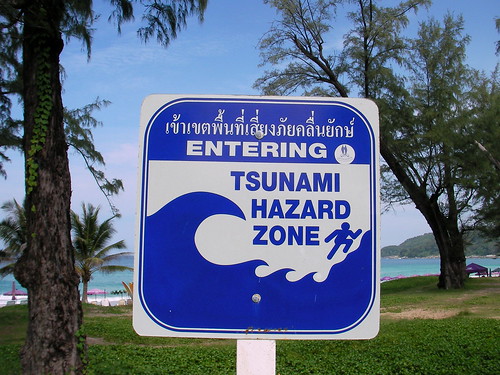
As a favor to a former publisher who was hungry for a personal account of the tsunami that struck southern Thailand on December 26, 2004, I wrote the following for The Daily Register of Harrisburg, Illinois, the first paper I worked for out of college:
The way Thailand has pulled together to help those in need after the December 26 tsunami reminded me of Harrisburg's efforts to send aid to the victims of the Mississippi River flood of 1993.
There might not have been a warning or any way to stop what happened, but what really matters is how people reacted.
From the tsunami disaster, the stories I could relate to most were those of survival, or the "what if's", tales from folks who took a different turn or were sleeping on a different floor and missed the waves. I had been in Phuket doing some canoeing just a month before, so I felt as if I had avoided the disaster as well.
It took awhile for these feelings to crystallize, though.
A massive earthquake struck the Indian Ocean region the morning after Christmas Day, but I didn't find out about it until 12 hours had passed since the first waves of the tsunami spawned by that quake hit the shores of southern Thailand.
Isolated in my Sunday morning routine of a big breakfast, catching some movies and shopping, I didn't feel the earth shake.
But the Internet news reports I became obsessed about reading said the magnitude 9 earthquake that shook the seabed near Sumatra, Indonesia, made buildings sway in Bangkok and Singapore.
Really, it was more than 24 hours after the disaster until I could fully absorb the enormity of what had happened.
Arriving at my newspaper office on Monday afternoon, I was laughing and joking with colleagues, noting that the quake had wiped out the daily feature page that is on the back of the front section. It had been replaced at the last minute on Sunday night with photos of the disaster.
Soon it became apparent that the tsunami was nothing to laugh about. Thousands of people were dead -- a good many of them tourists on their holidays.
Raucous, joyous occasions across the country were cancelled and replaced with muted memorial gatherings and disaster-relief benefits.
I got in touch with my friends in Phuket, where the disaster in Thailand was the worst. Among them was John Gray, who runs the canoe operation I went with.
A former resident of Hawaii and accustomed to sea changes, he felt the quake was able to save his workers and clients because he knew what was coming. But thousands of others weren't so fortunate. Phuket is cleaning up, and the tourism authorities hope travellers won't stay away for too long.
Another friend was in Phuket's Patong Beach, which was hit hard by the tidal waves. You might have seen the footage on CNN, of waves overwhelming utility poles and washing through two-story hotels there.
My friend had just missed the waves by taking a wrong turn on his motorcycle. He found his favorite restaurant an empty shell, the whereabouts of its staff unknown. Rather than let his grief overcome him, he decided to work through it by visiting the local hospitals, going from room to room and talking with the injured. Eventually, the sadness and horror of the disaster caught up with him, but by then he was able to come to Bangkok and share his stories. So now I share them with you.
(Photo credit: N1 via Flickr)